So you’re considering raising a domestic Muscovy duck? Well, you’re a smart cookie because they make great pets! And you get eggs!
This breed of duck, with its red face and friendly personality, is a great addition to any flock. You’ll get white eggs and be able to watch them hatch ducklings. You’ll also enjoy seeing them gobble goodies from the water, and generally love life!
In this article, you’ll learn all about Muscovies, how to care for them, what raising Muscovy ducks is like, and what makes them unique!
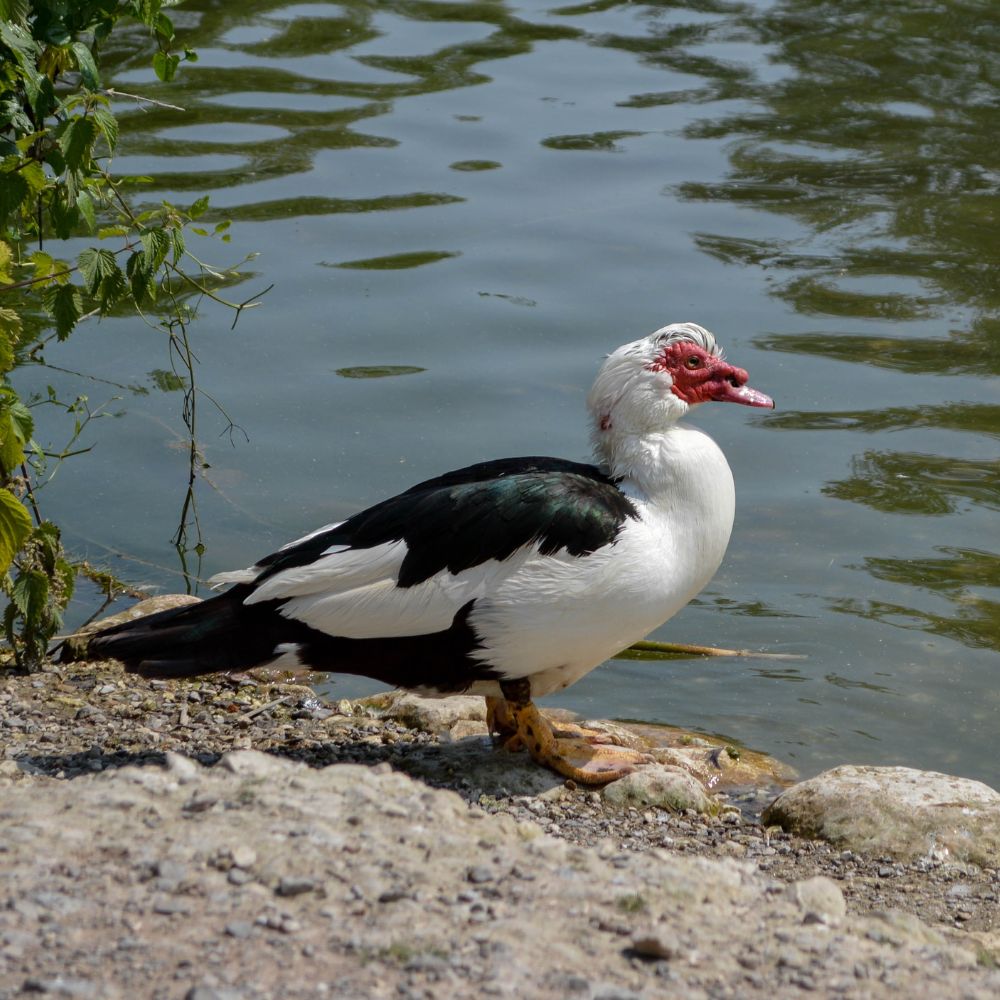
Table of Contents (Quickly Jump To Information)
5 Interesting Muscovy Duck Facts
- The Muscovy duck is the only type of domesticated duck that doesn’t descend from the mallard.
- Muscovies are the only duck breed that perches in trees and has sharp claws specifically for this purpose.
- They don’t swim as much as other ducks and aren’t as water resistant because they have underdeveloped oil glands.
- They don’t quack – they communicate by hissing and using other small vocal noises. They also wag their tails and lower their heads to communicate together.
- They’re mosquito-eating machines! If you have a lot of mosquitoes in your yard, get a Muscovy duck!
Are Muscovy Ducks Good Pets?
Yes! Raised correctly and when regularly exposed to human company, Muscovies can make great pets. They’re easy to care for, and don’t require much beyond food, water, shelter, and adequate space. They’re pretty inexpensive, especially if you grow your own food for them. In return, you’ll get eggs!
However, just remember that some ducks (and this isn’t particular to Muscovies) don’t like cuddling. Muscovies have sharp claws, which are necessary to defend themselves in the wild, so if your duck doesn’t want to be picked up, he or she might scratch you.
What Does A Muscovy Duck Look Like?
Muscovies have similar bodies to most ducks, however, they are very distinctive looking. They have red faces with a raised, fleshy area called a “caruncle.” The males (also called drakes) usually developed the caruncle earlier and are more pronounced that the females.
The caruncle is such that you will probably love it, or hate it. You’ll have to be the judge.
Muscovy ducks come in a variety of colors which include:
- Black & White Mottled (called “pied”)
- White
- Black
- Chocolate
- Blue
How Do You Tell The Difference Between Male And Female Muscovy Ducks?
Male ducks will be much larger than the females, with more pronounced caruncling (raised fleshy area on their faces) than females. They’ll also have their thicker legs, bigger feet, and a larger crest. This sounds easy until you try to tell what sex your own ducks are as not all of these features are immediately obvious.
Perhaps the best way to tell is to observe during mating time!
What Are Muscovy Ducks Used For?
Most people keep Muscovy ducks for their eggs and companionship, but traditionally, they’ve been kept for meat as well. This breed lays about 120 eggs per year, and is said to have the highest meat yield of any duck. For these reasons, Muscovy ducks are very popular dual-purpose ducks for homesteads and small farms.
Muscovy Duck Eggs
Any part of owning ducks includes getting eggs! It’s one of the best parts of owning any type of domestic fowl. Here’s everything you need to know about Muscovy ducks and their eggs!
Are Muscovy Ducks Good Egg Layers?
Muscovies are fair egg layers, and you can expect about 120 white eggs per year. It’s important to remember that, unlike chickens, ducks don’t typically lay in a nest box – so you’ll have to provide a nice environment that’ll prompt them to lay eggs. A hidden area in a duck house with a bed of straw is usually inviting.
You’ll also have to provide a good diet so your hens have enough protein and energy to give you eggs. Duck treats can be hard to find, but you can use high-quality chicken treats like these.
At What Age Do Muscovy Ducks Lay Eggs?
You can expect your Muscovy hens to start laying eggs at about 28 weeks (approximately 6 months). This depends on a few factors, including diet, season (ducks don’t really lay eggs in winter), and environment (high-stress levels can stop egg production).
What Age Do Muscovy Ducks Stop Laying Eggs?
Most ducks stop laying at about 3 years of age, although that will depend on the individual bird. A good diet full of protein will help your Muscovies lay eggs for a long time.
You can learn about why domestic fowl stop laying eggs here (and what to do about it).
Do Muscovy Ducks Move Their Eggs?
When sitting on a nest, ducks don’t generally move their eggs. If a predator attacks the nest or chases off the hen, the mother will likely move on and lay enough eggs for a different clutch.
Do Muscovy Ducks Lay Eggs All Year?
No, ducks typically stop laying eggs in the winter, when they need to conserve energy to stay warm.
Muscovy Duck Personalities
Are Muscovy Ducks Friendly?
Yes, if raised to enjoy human company (if you spend a decent amount of time handling them). Like most waterfowl, self-defense is part of their nature in the wild. So, if you don’t spend time with your Muscovies, you might not be able to enjoy them as much.
In general, Muscovy ducks are curious, intelligent, and social birds. However, they might not like to be cuddled or pet very much. But they are exceptionally fun to observe.
Are Muscovy Ducks Aggressive?
Not usually. During most of the year, they’re friendly and enjoy human company (especially if it involves treats.) You might notice that they come up to you the instant they see you!
However, if a hen is on her nest, she might hiss to protect herself. Since she can’t move (she needs to keep incubating her eggs), it’s her only defense. Similarly, the drakes can be protective and territorial of mates and their ducklings. It’s only natural!
During these times, it’s best to keep your distance and know your ducks are being good parents. If you don’t want to deal with this, then remove the eggs from their housing area each day to discourage nesting.
You should also know that like most male ducks, the drakes can be very aggressive towards the females during mating season (even if they’re not aggressive towards humans). The mating season is from August to May.
The best Muscovy drake-to-hen ratio is 10 hens for every 1 drake. However, you might opt to only raise female Muscovies.
Do Muscovy Ducks Bite?
As a general rule, no. They’re friendly birds who enjoy human company. However, like any animal that is provoked or threatened, your duck might claw or bite you to protect itself. It’s always best to treat your ducks gently.
Can Muscovy Ducks Quack?
No, Muscovies don’t quack! (Which makes them fairly quiet ducks compared to other ducks who are generally vocal and love to let you know when things aren’t perfect).
The males hiss and the females make a sort of weak quack called a pip (which sounds a bit like a flute sound).
Unlike other duck breeds, Muscovies aren’t descended from mallards, and so have a uniqueness all their own. Muscovy duck communication includes a type of hiss that sounds similar to a goose hiss.
Why Do Muscovy Ducks Hiss?
Muscovies hiss because they don’t really quack – the hiss is their way of quacking. The females make very faint quacking-type sounds.
Only the males hiss. You also might notice more hissing during mating season – this is the males defending their territory and their mates.
How To Raise Muscovy Ducks
To successfully raise Muscovies, there are a few things you’ll want to put some thought into. There are three main categories you need to focus on. Let’s dive in.
1. Food
What Can Muscovy Ducks Eat?
Like most ducks, Muscovies love to forage for goodies in the grass. However, this isn’t enough – you should also offer high-quality duck feed to make sure you still get eggs. Without it, you might not get as many eggs and your ducks might not be as healthy.
Muscovies are omnivorous and will enjoy hunting for bugs. They also enjoy bananas. (weird but true).
Feeding Adult Muscovies
- Layer feed
- Bugs (such as dried black soldier fly larvae)
- Grass & other leafy greens
- Fruit
- Eggs
In particular, Muscovies love MOSQUITOES. Which is a huge benefit to anyone living in the South. (We all know how bad mosquitoes can get).
If you want to grow food for your Muscovies, you can learn how to grow leafy greens for ducks here.
Like most ducks, they love searching for goodies in water, dipping their bills into even the muddiest pond water to see what they can snag.
Some things they might love finding are:
- Larvae
- Small aquatic animals (like tadpoles or water insects)
- Snails
- Leaves
- Seeds
- Slugs
You should also be aware of what ducks SHOULDN’T eat. Avoid:
- Chocolate
- Sugars
- Coffee
- Seeds from stone fruit (like peach pits)
- Avocado skins
- Apple seeds
If you’re wondering how to call a Muscovy duck, simply shake a bag of treats, and they’ll come running!
Feeding Muscovy Ducklings
When they’re tiny, Muscovy ducklings have different feed concerns. You’ll want to raise them on a 16% duckling starter – a feed that’s specifically formulated for baby ducks.
Baby ducks need more niacin than chicks, so it’s critical to provide the right feed so your ducklings grow correctly. Without it, you might notice their bills and bones not developing right.
If you can’t buy duckling feed, you can mix brewer’s yeast with chick starter. You can discover how to raise ducklings here and get a full list of what Muscovy ducklings eat here.
If you want to hatch duck eggs, you can discover the best incubators here.
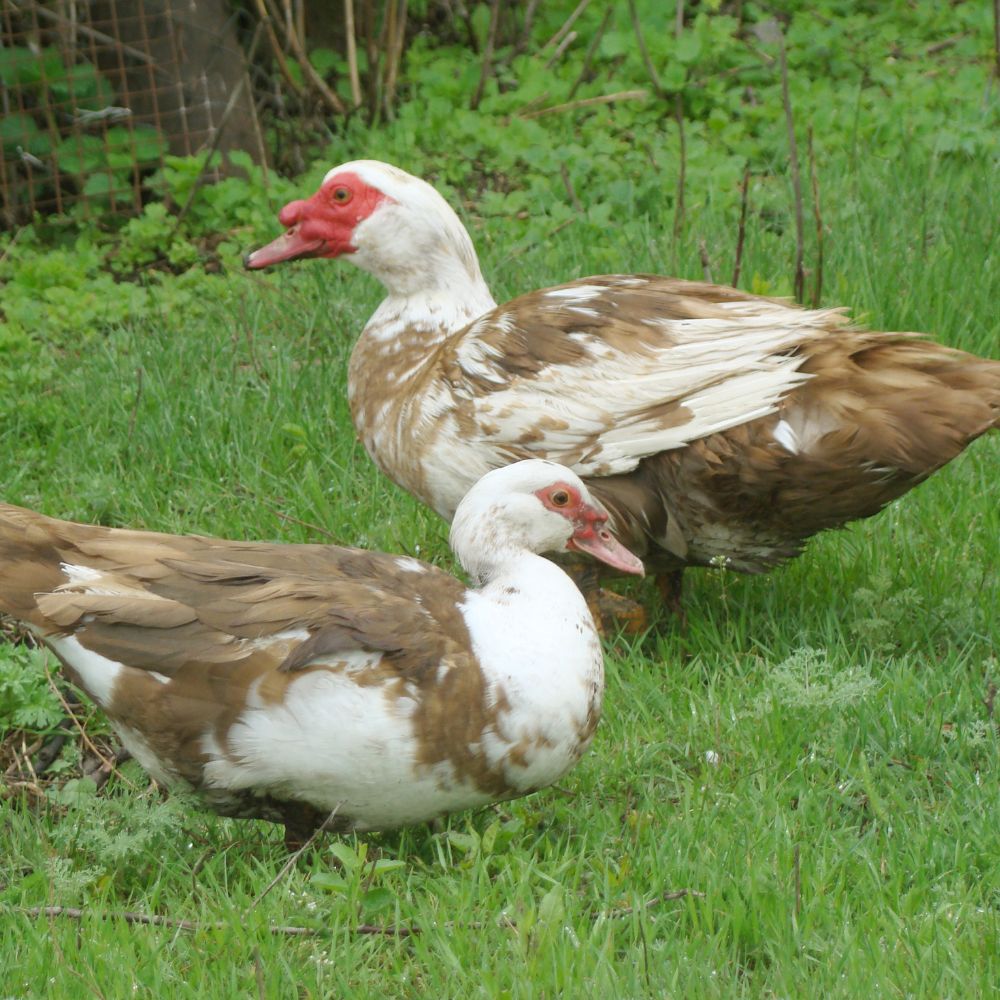
2. Shelter
Do Muscovy Ducks Need Shelter?
Like all ducks, your housing for Muscovy ducks needs to keep them safe. It should keep predators out (learn how to build a predator proof coop here) and keep them out of the elements.
In the winter, it should keep them dry, and in the summer, it should offer protection from the sun.
Since Muscovy ducks do perch (unlike other duck breeds), you’ll need to provide a roosting area. It’s best to make the perches fairly wide to accommodate your flock’s large feet.
You can learn what a coop should include here.
How Much Space Do Muscovy Ducks Need?
You should provide 10 to 15 square feet of space per duck. Without it, your ducks might start to feel stress, stop laying eggs, and develop bad habits (like feather picking, bullying, or fighting). Having enough space also keeps their living area overall cleaner.
Can Muscovy Ducks Survive Winter?
Yes – plenty of people raise Muscovies in cold areas. Just be sure to provide a warm, safe home for them to live in.
3. Swimming
Do Muscovy Ducks Need Water?
It’s always a good idea to provide a pool full of cool, inviting water for your ducks! While Muscovies aren’t as water resistant as other ducks, they still enjoy digging for treats and spending time in their pools.
You can use a kiddie pool or build a pond for your flock. You will also want to provide a separate drinking area to ensure your flock can access clean water. You can read about recommended waterers here and learn how to build a DIY automatic waterer for $12 here.
Can Muscovy Ducks Swim?
Yes, they can swim, although they’re less likely to take a turn in the pool than other ducks. This is because they don’t have efficient oil glands like other duck breeds.
However, because of the shape of their bills, it’s easier for Muscovies to eat food that’s in water, so you’ll likely often see your Muscovy ducks in the water if they have the chance.
Additional Muscovy FAQ
How Long Do Muscovy Ducks Live?
The Muscovy duck lifespan average will range between 5 to 12 years. This depends on a lot of factors, including diet, shelter, and environment. You can learn more about how long ducks live here (and how to increase their lifespan) and about how to raise healthy ducks here.
Can You Eat A Muscovy Duck?
Yes, Muscovies have been kept for centuries because of their meat. Some owners say that these ducks have delicious lean, tender meat. They have larger breasts than common ducks and the meat is less fatty.
Can Muscovy Ducks Fly?
Yes, Muscovy ducks can fly (unlike most domestic breeds). However, they’re unlikely to fly away, especially if you offer plenty of treats.
Do All Muscovy Ducks Have Red Faces?
The Muscovy duck has one of the most obvious characteristics that can differentiate them from others- which is its red facial skin. This red skin can be quite bumpy, exaggerated, and with a knob on top of the bill and lumps all over.
Why Do Muscovy Ducks Have Red Faces?
Muscovy ducks have caruncles which are the red fleshy parts around their face, also called a face mask. These caruncles help Muscovies keep their feathers clean when they come in contact with mud.
Do Muscovy Ducks Mate For Life?
No, typically they don’t. In fact, if no Muscovy drakes are available, the hens will mate with males from other duck breeds. However, their ducklings will be sterile and unable to produce further offspring.
When is Muscovy Mating Season?
The mating season of the Muscovy can last from August to May.
Summary
Now you know a lot more about the Muscovy duck breed. You also know more about their food requirements, their shelter needs, and their swimming habits. All that’s left is for you to find some ducklings and get started! You can find Muscovy ducks at many hatcheries, but you can also check for local breeders.
Maat van Uitert is a backyard chicken and sustainable living expert. She is also the author of Chickens: Naturally Raising A Sustainable Flock, which was a best seller in it’s Amazon category. Maat has been featured on NBC, CBS, AOL Finance, Community Chickens, the Huffington Post, Chickens magazine, Backyard Poultry, and Countryside Magazine. She lives on her farm in Southeast Missouri with her husband, two children, and about a million chickens and ducks. You can follow Maat on Facebook here and Instagram here.

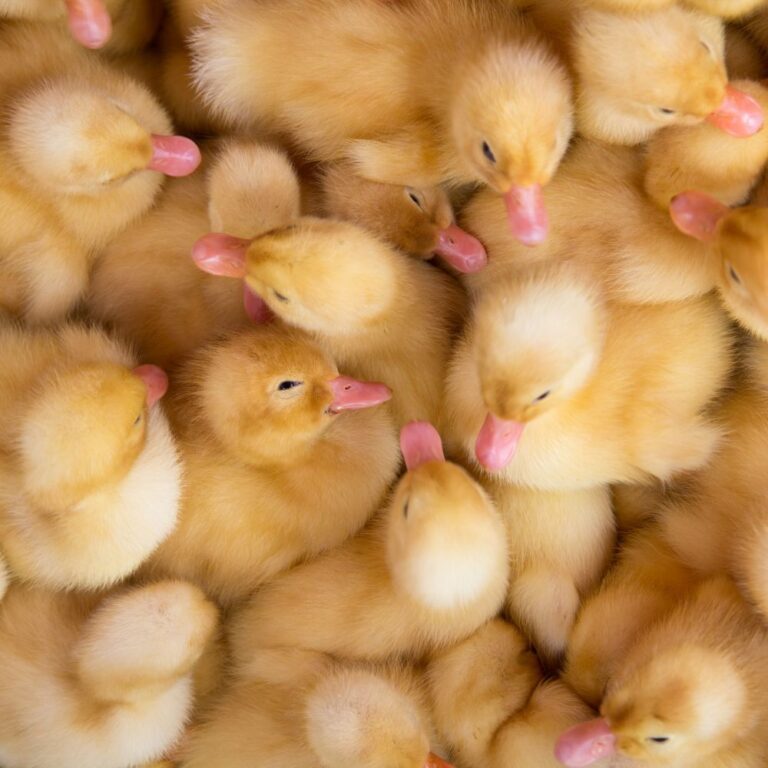
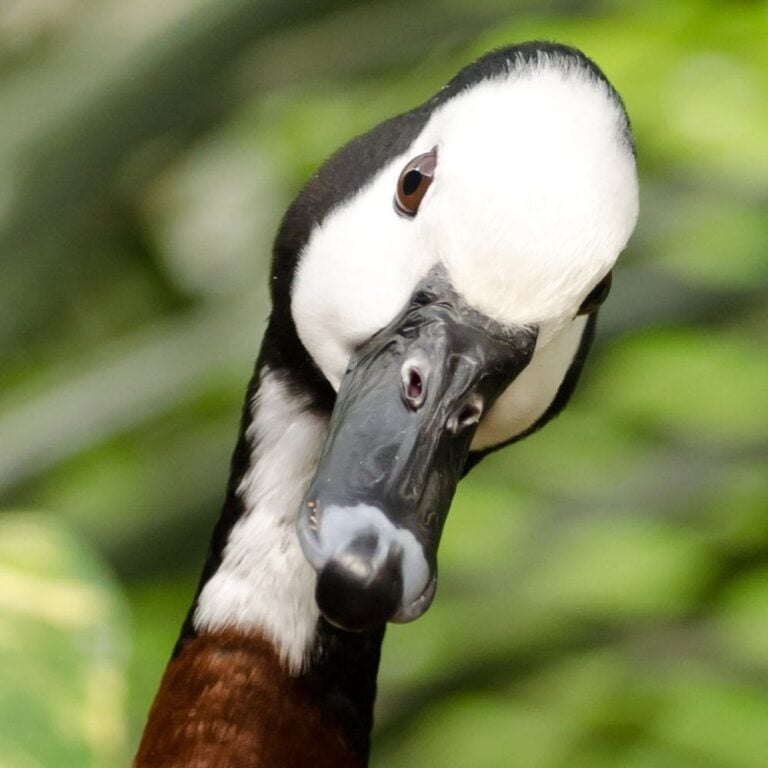
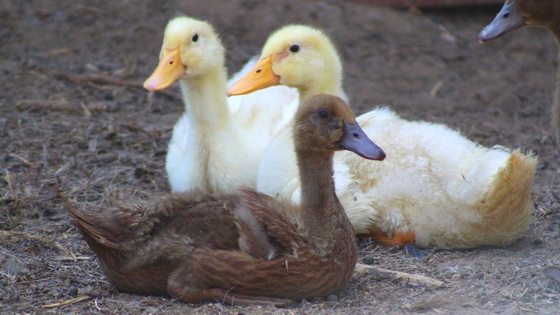

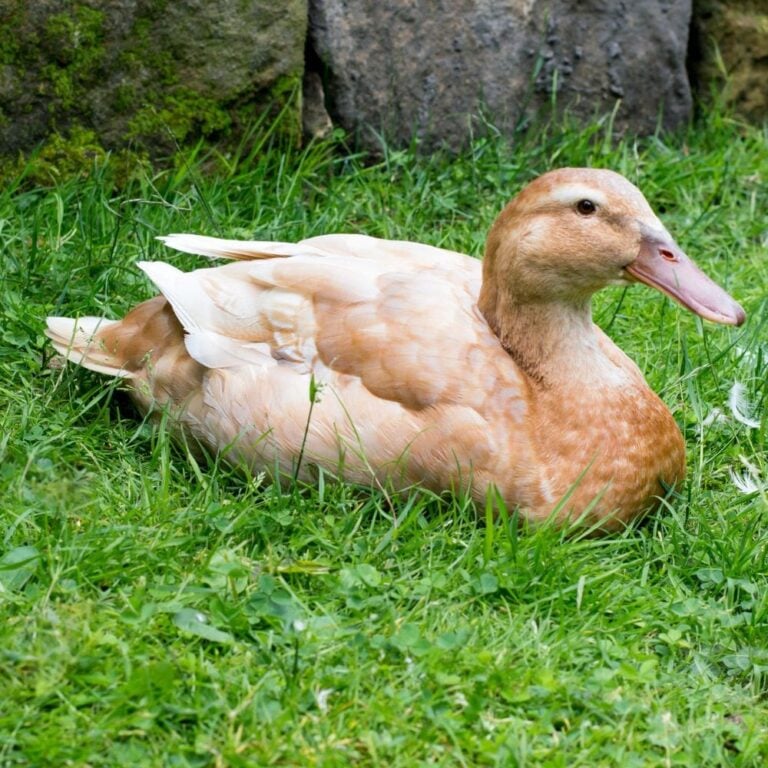
![4 Types Of Poultry You Can Raise With Hens To Be More Self-Sufficient [Podcast]](https://thefrugalchicken.com/wp-content/uploads/2016/07/raise-poultry-with-chickens-feature-min.jpg)
Where to buy Muscovies?
Hi Robert – it looks like Freedom Ranger Hatchery has them for sale.